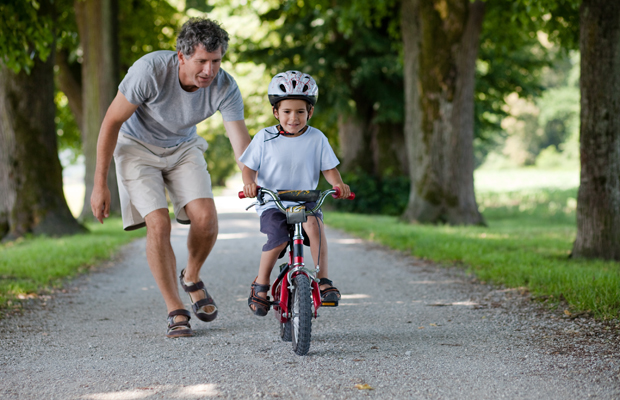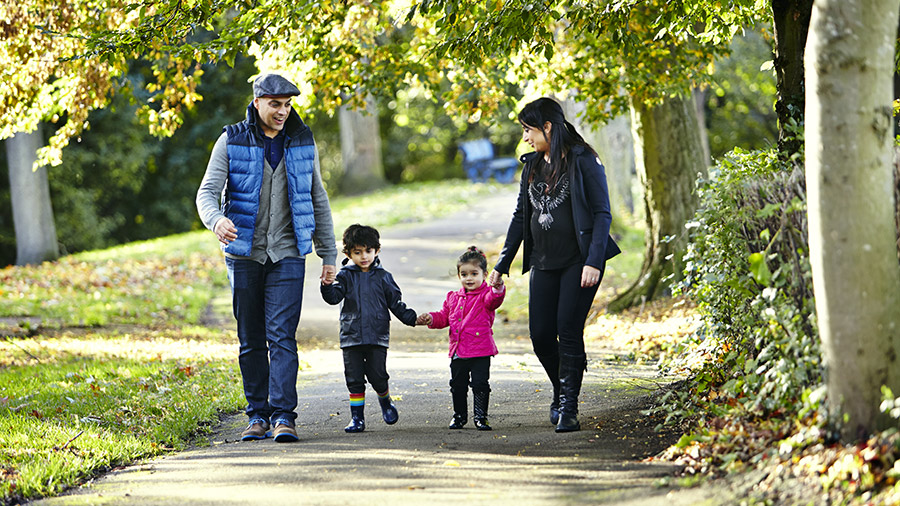Nowadays, many kids are spending their time more in front of the TV, computer, or their mobile phone. Today’s busy families also have fewer times to prepare nutritious, home-cooked meals—so children are very familiar with fast-foods. Children who don’t have enough physical activities and the consumption of fast-food are prone to obesity.
Maybe many people consider that exercises for children are not as important as for adults. No, children don’t have to work out in the gym. Exercises for children mean playing and being physically active. Children who are active will have stronger muscles and bones, have leaner body, be less likely to become overweight, decrease the risk of type 2 diabetes, lower blood pressure, and have a better outlook on life.
These simple but beneficial physical exercises for your children (and you can join too) will help them to become healthier and prevent themselves from obesity:
Bicycling
It seems that every child remembers learning how to ride a bike. In addition to being lots of fun, bicycle riding is also a great form of exercise. Children can start on a three-wheel tricycle as young as age 2. By the time they’re at the age of 5, parents can then introduce a two-wheeler with training wheels. Usually in several months the training wheels can come off. Make sure that your children riding their bicycle in a safe place, such as bike paths in a park. Don’t let your children to ride their bicycle in the streets. It will be more fun if the whole family go bicycling together!
Bicycling can improve your children’s leg strength, coordination, balance, cardiovascular fitness, and control their weight. As for social benefits, bicycling can train their discipline, self-esteem, sense of community, family bonding, feeling of freedom, and environmental awareness.
Walking
It may sound boring, but walking is one of the best (and cheapest) forms of exercise that kids (and adults) can get. If your children don’t enjoy extreme physical exertion or competition games, then walking will be helpful to them. Children as young as the age of 2 can go out for short walk with their parents. When your children are 5 or 6, you can start to take them for hiking! It’s a great opportunity to see the world, get in touch with nature, and of course, stay in shape.
Walking can develop children’s balance, coordination, leg strength, and weight control. It also gives children feeling of freedom, develop their self-esteem, improve their environmental awareness, and strengthen family bonding.
Swimming
Teaching your children to swim and encouraging them to swim regularly can have significant benefits for both their health and safety. On a hot day, swimming can be a very fun activity for your children—well, who doesn’t love water activity in a hot, sunny day?
Swimming is a good cardiovascular workout that promotes heart and lung health, improves strength and flexibility, increase stamina, and improve balance and posture. Swimming also can improve children’s mental and emotional health.
Gardening
Physical activities for children don’t have to be always fun. If you have a yard or balcony, you can involve your kids in gardening activities. They can dig, rake, weed, or water the plants. Working in the garden offers a physical challenge along with an opportunity to care for the earth and enjoy nature. You can ask them to plant vegetables to give them education about healthy foods and nutrition.
Gardening is educational and develops children’s new skills such as responsibility, love of nature, and creativity. It also gives them a lesson about patience as they wait for the plants to grow. Gardening is a chance for you to teach them about simple science and nature from growing their own food.
Play soccer
Soccer is one of the simple physical activities that your kids can do. Kids as young as 4 years old can participate in soccer—with a smaller ball and field than older children. They can play with their friends, cousins, or of course, their parents. Soccer’s fast pace allows to hold the attention of kids who would frequently get bored playing other sports.
Soccer can improve children’s cardiovascular endurance, muscle strength, flexibility, and coordination. Because soccer is a group game, it can train their discipline, teamwork, leadership, fairness, and self-esteem.
Living a healthy lifestyle should be started from the very young age. Teach your kids to take care of their body by doing physical activities and consume nutritious foods. Exposure to their favorite TV show or game console is acceptable, but make sure they don’t get addicted to them. Balance their activities with outdoor physical activities and of course, enough rest time.




![Happy mother with her children gardening. [url=http://www.istockphoto.com/search/lightbox/9786778][img]http://dl.dropbox.com/u/40117171/family.jpg[/img][/url] [url=http://www.istockphoto.com/search/lightbox/9786750][img]http://dl.dropbox.com/u/40117171/summer.jpg[/img][/url]](https://www.indoindians.com/wp-content/uploads/2016/02/Gardening.jpg)




